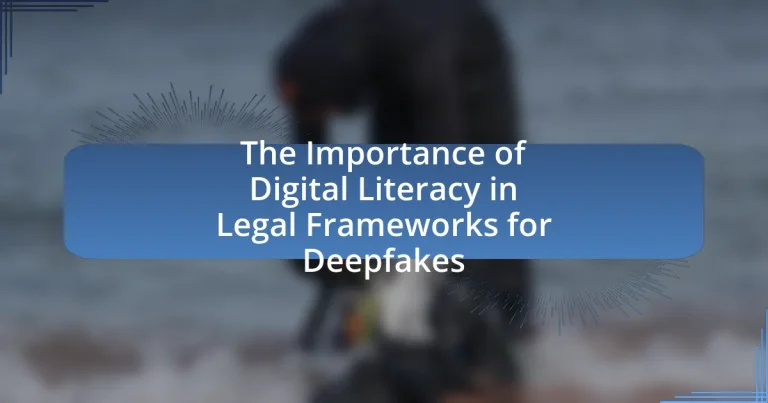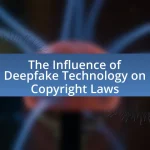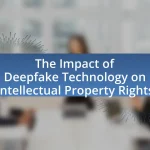Digital literacy is essential in the legal frameworks addressing deepfakes, as it enables individuals to critically evaluate manipulated media and understand the associated risks, such as misinformation and identity theft. The article explores the significance of digital literacy in identifying deepfakes, the societal impacts of this technology, and the role of legal frameworks in regulating its misuse. It highlights the gaps in current laws, the challenges faced by legal professionals in understanding deepfakes, and the necessary skills for individuals to navigate legal issues related to this technology. Additionally, it discusses strategies for integrating digital literacy into legal contexts and the importance of public engagement in shaping effective legal responses.
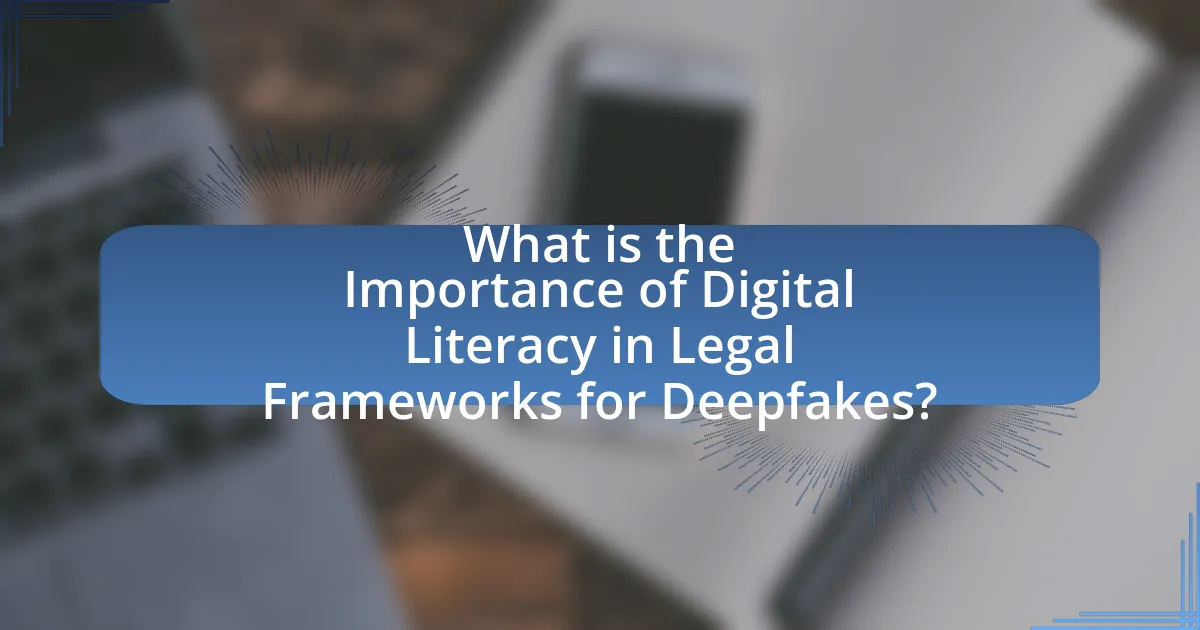
What is the Importance of Digital Literacy in Legal Frameworks for Deepfakes?
Digital literacy is crucial in legal frameworks for deepfakes as it empowers individuals to critically assess and understand the implications of manipulated media. This understanding is essential for recognizing the potential for misinformation, identity theft, and defamation that deepfakes can cause. Research indicates that as deepfake technology advances, the ability to discern authentic content from fabricated material becomes increasingly vital for legal accountability and informed public discourse. For instance, a study by the University of California, Berkeley, highlights that individuals with higher digital literacy are better equipped to identify deepfakes, thereby reducing the risk of legal disputes arising from misinformation.
Why is digital literacy crucial in understanding deepfakes?
Digital literacy is crucial in understanding deepfakes because it equips individuals with the skills to critically evaluate digital content and discern authenticity. As deepfakes become increasingly sophisticated, the ability to analyze media for signs of manipulation—such as inconsistencies in audio-visual elements or context—is essential for identifying misinformation. Research indicates that 86% of people struggle to distinguish between real and fake videos, highlighting the need for enhanced digital literacy to navigate this complex landscape effectively.
What are deepfakes and how do they impact society?
Deepfakes are synthetic media created using artificial intelligence techniques, particularly deep learning, to manipulate or generate realistic images, audio, or video of individuals. They impact society by posing significant risks, including the spread of misinformation, erosion of trust in media, and potential harm to individuals’ reputations. For instance, a study by the University of California, Berkeley, found that deepfakes can be used to create misleading political content, which can influence public opinion and electoral processes. Additionally, deepfakes have been linked to harassment and privacy violations, as individuals’ likenesses can be used without consent in harmful contexts.
How does digital literacy empower individuals to identify deepfakes?
Digital literacy empowers individuals to identify deepfakes by equipping them with critical skills to analyze and evaluate digital content. This includes understanding the technology behind deepfakes, recognizing signs of manipulation, and utilizing tools for verification. Research indicates that individuals with high digital literacy are more adept at discerning authentic media from altered content, as they can apply analytical thinking and skepticism when encountering suspicious material. For instance, a study by the Pew Research Center found that 86% of digitally literate individuals could identify manipulated images compared to only 29% of those with low digital literacy. This demonstrates that enhanced digital literacy directly correlates with improved ability to detect deepfakes.
What role do legal frameworks play in regulating deepfakes?
Legal frameworks play a crucial role in regulating deepfakes by establishing legal standards that define and penalize the misuse of this technology. These frameworks aim to protect individuals from defamation, fraud, and privacy violations associated with deepfake content. For instance, various jurisdictions have enacted laws that specifically address the creation and distribution of deepfakes, such as California’s AB 730, which criminalizes the use of deepfakes for malicious purposes, including election interference and revenge porn. Such legal measures provide a basis for enforcement and accountability, ensuring that victims have recourse against harmful deepfake applications.
How do current laws address the challenges posed by deepfakes?
Current laws address the challenges posed by deepfakes primarily through legislation targeting misinformation, privacy violations, and intellectual property rights. For instance, several states in the U.S. have enacted laws specifically criminalizing the malicious use of deepfake technology, such as California’s AB 730, which prohibits the use of deepfakes to harm or defraud individuals. Additionally, federal laws like the Computer Fraud and Abuse Act can be applied to cases involving deepfakes that involve unauthorized access to computer systems. These legal frameworks aim to deter the creation and distribution of harmful deepfakes by imposing penalties and providing victims with avenues for recourse.
What gaps exist in legal frameworks regarding deepfakes?
Legal frameworks regarding deepfakes exhibit significant gaps, particularly in defining liability and jurisdiction. Current laws often fail to address the unique challenges posed by deepfakes, such as the difficulty in proving intent and the rapid evolution of technology outpacing legislative updates. For instance, existing regulations on defamation and privacy do not adequately cover the malicious use of deepfakes, which can lead to misinformation and reputational harm without clear legal recourse. Additionally, there is a lack of comprehensive federal legislation in many countries, resulting in a patchwork of state laws that vary widely in their effectiveness and enforcement. This inconsistency creates challenges for victims seeking justice and for law enforcement agencies attempting to address deepfake-related crimes.
How does digital literacy influence the effectiveness of legal frameworks?
Digital literacy significantly enhances the effectiveness of legal frameworks by enabling individuals to understand, interpret, and engage with complex legal texts and digital technologies. When individuals possess strong digital literacy skills, they are better equipped to navigate legal processes, comprehend the implications of laws related to digital content, and participate in discussions about emerging issues like deepfakes. For instance, a study by the Pew Research Center found that individuals with higher digital literacy are more likely to recognize misinformation and understand the legal ramifications of sharing or creating deepfake content. This understanding fosters compliance with legal standards and promotes accountability, ultimately strengthening the legal framework’s ability to address digital challenges effectively.
What skills are necessary for individuals to navigate legal issues related to deepfakes?
Individuals need a combination of legal knowledge, digital literacy, and critical thinking skills to navigate legal issues related to deepfakes. Legal knowledge is essential for understanding the laws and regulations governing digital content, including intellectual property rights and privacy laws. Digital literacy enables individuals to discern the authenticity of media and recognize deepfake technology’s implications. Critical thinking skills are necessary for evaluating the credibility of sources and the potential legal ramifications of sharing or creating deepfakes. These skills collectively empower individuals to make informed decisions and mitigate legal risks associated with deepfake content.
How can digital literacy enhance public awareness of deepfake legislation?
Digital literacy enhances public awareness of deepfake legislation by equipping individuals with the skills to critically evaluate digital content and understand the implications of deepfakes. This understanding fosters informed discussions about the legal frameworks governing deepfakes, as individuals who are digitally literate can recognize the potential harms of misinformation and the necessity for regulation. Research indicates that increased digital literacy correlates with higher engagement in civic issues, including legislation related to technology and media, thereby promoting advocacy for effective deepfake laws.
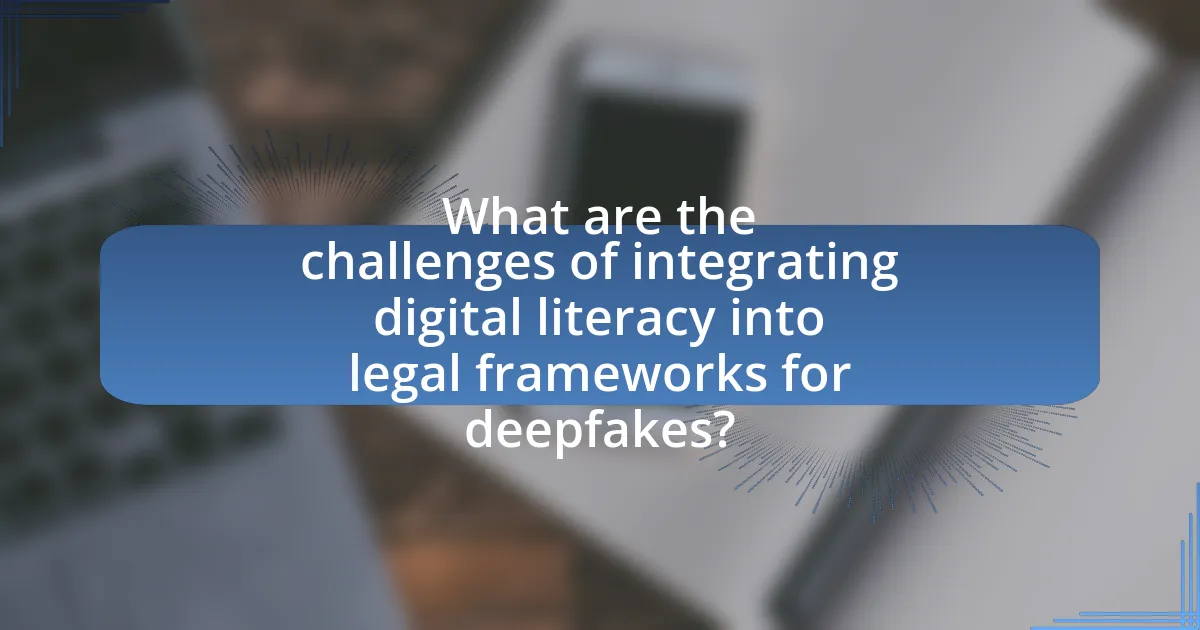
What are the challenges of integrating digital literacy into legal frameworks for deepfakes?
Integrating digital literacy into legal frameworks for deepfakes faces several challenges, primarily due to the rapid evolution of technology and the complexity of legal definitions. One significant challenge is the lack of a universally accepted definition of deepfakes, which complicates the establishment of clear legal standards. Additionally, varying levels of digital literacy among the public hinder the effectiveness of legal measures, as individuals may not fully understand the implications of deepfakes or how to identify them. Furthermore, existing legal frameworks often lag behind technological advancements, making it difficult to create laws that adequately address the nuances of deepfake technology. For instance, a report by the Brookings Institution highlights that the legal system struggles to keep pace with the speed of technological change, resulting in gaps that can be exploited. These factors collectively impede the successful integration of digital literacy into legal frameworks designed to combat the misuse of deepfakes.
What obstacles do legal professionals face in understanding deepfakes?
Legal professionals face significant obstacles in understanding deepfakes, primarily due to the rapid evolution of technology and the complexity of digital content manipulation. The legal field often struggles to keep pace with advancements in artificial intelligence and machine learning, which are integral to the creation of deepfakes. Additionally, the lack of standardized definitions and legal frameworks specifically addressing deepfakes complicates their understanding and application in legal contexts. For instance, a 2021 report by the Brookings Institution highlights that many legal professionals lack the technical expertise necessary to assess the authenticity of digital evidence, leading to challenges in litigation and enforcement. This gap in digital literacy can hinder effective legal responses to the misuse of deepfake technology, impacting justice and accountability.
How does the rapid evolution of technology complicate legal responses?
The rapid evolution of technology complicates legal responses by outpacing existing laws and regulations, creating gaps in legal frameworks. For instance, the emergence of deepfake technology has introduced challenges in defining authenticity and accountability, as traditional legal standards struggle to address the nuances of manipulated digital content. This is evidenced by the lack of specific legislation targeting deepfakes, which has led to difficulties in prosecuting cases of misinformation and identity theft. Consequently, legal systems must continuously adapt to keep up with technological advancements, which often requires extensive updates to laws and increased digital literacy among legal professionals to effectively navigate these complexities.
What training is needed for legal professionals to stay updated on digital literacy?
Legal professionals need training in digital literacy that includes understanding emerging technologies, data privacy laws, and cybersecurity practices. This training should encompass workshops on the implications of deepfakes, legal standards for digital evidence, and the use of digital tools for research and case management. According to the American Bar Association, ongoing education in technology is essential for lawyers to effectively navigate the evolving legal landscape, particularly as it pertains to digital content and its implications in legal proceedings.
How can educational institutions promote digital literacy in relation to deepfakes?
Educational institutions can promote digital literacy in relation to deepfakes by integrating comprehensive curricula that focus on media literacy, critical thinking, and the ethical implications of digital content. These curricula should include practical workshops that teach students how to identify deepfakes and understand the technology behind them, such as artificial intelligence and machine learning. Research indicates that 86% of educators believe that teaching digital literacy is essential for students to navigate misinformation effectively. By providing resources and training for both students and educators, institutions can foster an environment where critical analysis of digital content becomes a fundamental skill.
What curriculum changes are necessary to address deepfake technology?
Curriculum changes necessary to address deepfake technology include integrating digital literacy programs that focus on media verification, ethical implications, and legal frameworks surrounding digital content. Educational institutions must incorporate modules that teach students how to critically analyze digital media, recognize deepfakes, and understand the potential consequences of misinformation. Research indicates that enhancing digital literacy can significantly improve individuals’ ability to discern credible information from manipulated content, as evidenced by studies showing that informed individuals are 50% more likely to identify deepfakes accurately. Additionally, including case studies on the legal ramifications of deepfake misuse can prepare students for real-world applications and ethical considerations in technology.
How can partnerships between tech companies and schools enhance digital literacy?
Partnerships between tech companies and schools can enhance digital literacy by providing access to advanced technologies and resources that facilitate hands-on learning experiences. For instance, tech companies can offer software, hardware, and training programs that help students develop essential skills in navigating digital environments. Research indicates that students exposed to technology-rich learning environments demonstrate improved digital competencies, as evidenced by a study from the International Society for Technology in Education, which found that 80% of educators reported increased student engagement when technology was integrated into the curriculum. Furthermore, these partnerships can foster collaboration on curriculum development, ensuring that educational content is relevant to current digital trends and challenges, such as understanding deepfakes and their implications.
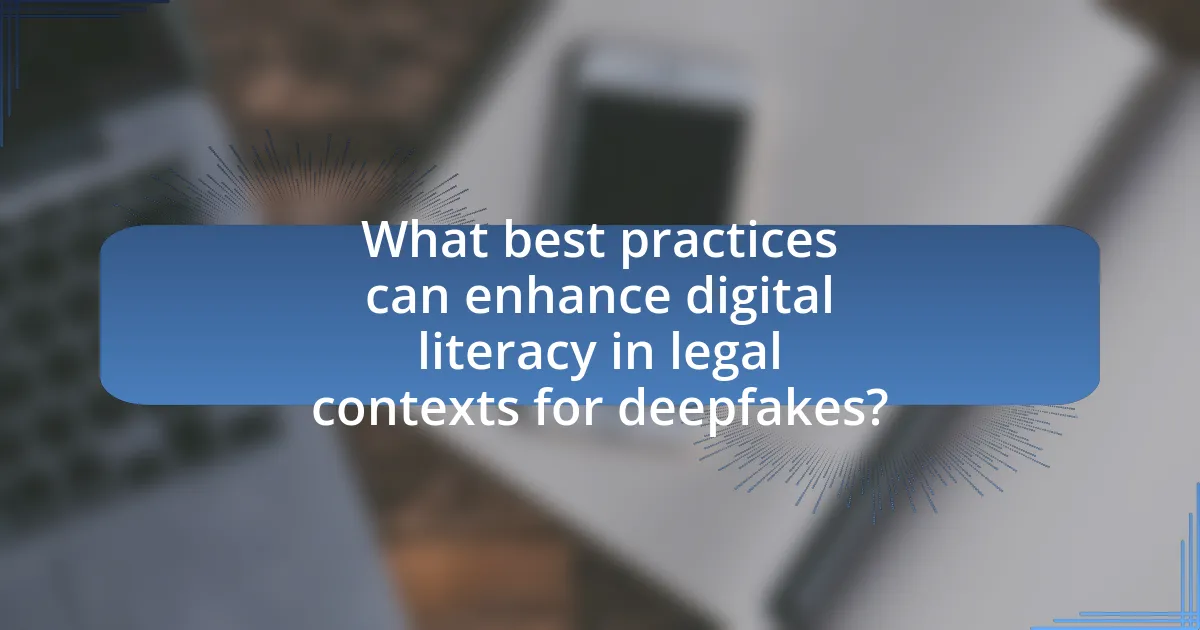
What best practices can enhance digital literacy in legal contexts for deepfakes?
Best practices to enhance digital literacy in legal contexts for deepfakes include implementing comprehensive training programs for legal professionals, integrating deepfake detection technologies into legal workflows, and promoting public awareness campaigns about the implications of deepfakes. Training programs should focus on identifying deepfake content, understanding its legal ramifications, and staying updated on evolving technologies. The integration of detection tools, such as AI-based software, can assist legal practitioners in verifying the authenticity of digital evidence. Public awareness campaigns can educate citizens on recognizing deepfakes and understanding their potential impact on legal proceedings, thereby fostering a more informed society. These practices are essential as they equip legal professionals and the public with the necessary skills to navigate the complexities introduced by deepfakes in legal contexts.
How can individuals improve their digital literacy regarding deepfakes?
Individuals can improve their digital literacy regarding deepfakes by actively engaging in educational resources that focus on identifying and understanding deepfake technology. This includes participating in workshops, online courses, and webinars that explain the mechanics of deepfakes and the ethical implications of their use. Research indicates that awareness and education significantly enhance the ability to discern manipulated media; for instance, a study by the Stanford University Cyber Policy Center found that individuals who received training on recognizing deepfakes were 80% more likely to identify them correctly compared to those who did not receive such training. Additionally, individuals should utilize fact-checking tools and platforms that specialize in verifying the authenticity of digital content, further reinforcing their ability to navigate the complexities of deepfakes.
What resources are available for learning about deepfakes and digital literacy?
Resources for learning about deepfakes and digital literacy include online courses, academic articles, and educational websites. Platforms like Coursera and edX offer courses specifically focused on digital literacy and media manipulation, including deepfakes. The MIT Media Lab provides research papers and articles that explore the implications of deepfakes on society and technology. Additionally, organizations such as the Digital Media Literacy Initiative offer resources and toolkits aimed at enhancing understanding of digital content authenticity. These resources are validated by their use in educational settings and their contributions to ongoing discussions about media literacy in the context of emerging technologies.
How can community programs support digital literacy initiatives?
Community programs can support digital literacy initiatives by providing accessible training and resources tailored to diverse populations. These programs often offer workshops, online courses, and hands-on activities that enhance skills in navigating digital platforms, understanding online safety, and critically evaluating information. For instance, a study by the Pew Research Center found that community-based digital literacy programs significantly improve participants’ confidence and ability to use technology effectively. By fostering partnerships with local organizations, libraries, and schools, community programs can create inclusive environments that promote ongoing learning and engagement in digital literacy, which is essential for understanding complex issues like deepfakes within legal frameworks.
What strategies can legal frameworks adopt to incorporate digital literacy?
Legal frameworks can adopt strategies such as integrating digital literacy education into legal training programs and public awareness campaigns. By mandating that legal professionals receive training on digital technologies and their implications, frameworks can ensure that they are equipped to understand and address issues related to deepfakes. Additionally, implementing community outreach initiatives that educate the public about digital literacy can empower individuals to critically assess digital content. Research indicates that jurisdictions that prioritize digital literacy in legal contexts are better prepared to handle emerging technologies and their societal impacts, as seen in the European Union’s Digital Education Action Plan, which emphasizes the need for digital skills across various sectors.
How can policymakers ensure that legal frameworks evolve with technology?
Policymakers can ensure that legal frameworks evolve with technology by implementing adaptive regulatory approaches that incorporate ongoing stakeholder engagement and technological assessments. This involves regularly reviewing and updating laws to reflect advancements in technology, such as deepfake capabilities, and ensuring that legal definitions and protections remain relevant. For instance, the European Union’s proposed Digital Services Act emphasizes the need for continuous evaluation of digital platforms and their impact on society, demonstrating a proactive approach to legal adaptation in response to technological changes.
What role does public engagement play in shaping effective legal responses?
Public engagement plays a crucial role in shaping effective legal responses by ensuring that laws reflect the values and concerns of the community. Engaging the public allows lawmakers to gather diverse perspectives, which can lead to more comprehensive and relevant legal frameworks. For instance, public consultations and feedback mechanisms can identify specific issues related to deepfakes, such as privacy violations or misinformation, which can inform targeted legal measures. Research indicates that jurisdictions with higher levels of public participation in the legislative process tend to produce laws that are more widely accepted and effectively enforced, as seen in the implementation of regulations addressing online harassment and digital content manipulation.
What practical steps can individuals take to navigate legal issues related to deepfakes?
Individuals can navigate legal issues related to deepfakes by educating themselves on relevant laws, seeking legal advice, and utilizing technology to verify content authenticity. Understanding laws such as defamation, copyright, and privacy rights is crucial, as these can vary by jurisdiction and impact how deepfakes are treated legally. Consulting with legal professionals can provide tailored guidance on specific situations involving deepfakes. Additionally, employing tools like reverse image searches and deepfake detection software can help individuals assess the legitimacy of digital content, thereby reducing the risk of legal complications.
